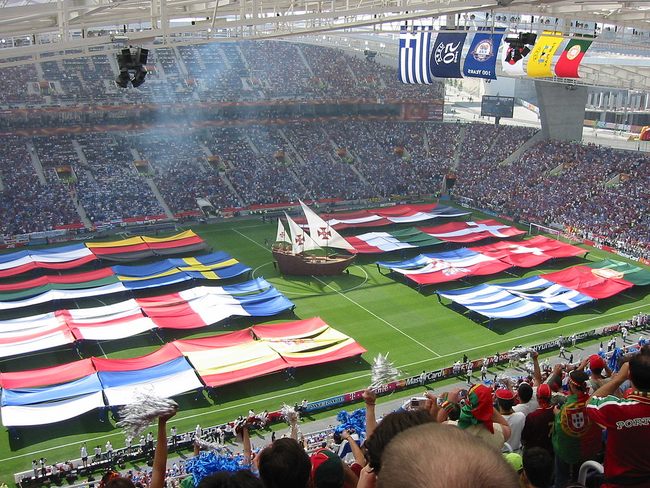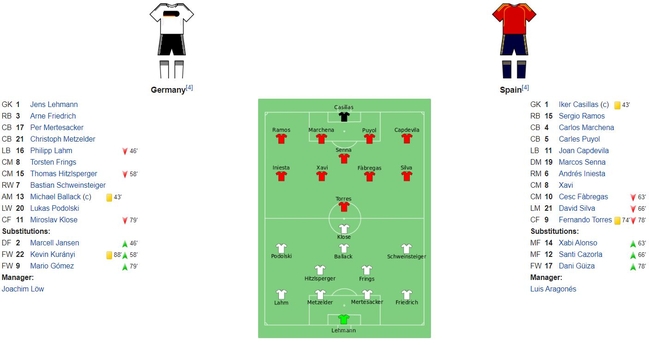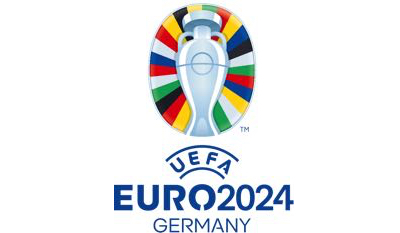 The European Championship, or the Euros as most people call them, is arguably the second biggest tournament in international football behind the World Cup. South American fans might disagree but the Euros are certainly at least on par with the Copa America and, due to greater strength in depth, many would consider it to be the superior competition. It sees the top European nations (and sometimes England too!) do battle to be crowned the best side on the continent.
The European Championship, or the Euros as most people call them, is arguably the second biggest tournament in international football behind the World Cup. South American fans might disagree but the Euros are certainly at least on par with the Copa America and, due to greater strength in depth, many would consider it to be the superior competition. It sees the top European nations (and sometimes England too!) do battle to be crowned the best side on the continent.
Like the World Cup, the European Championship takes place every four years (assuming a global health crisis doesn’t cause a postponement of course). Since the first tournament in 1960, there have been 10 different winners with two sides having won it three times each (Germany and Spain) and two more (Italy and France) claiming a brace of titles.
On this page, we’ll run through the winners and runners-up for all the Euros tournaments to date, and we’ll explain format of the tournament, including the qualification process and the tournament proper. We’ll also explain how hosts are selected and ascertain whether hosting gives a side a better chance of winning the Euros.
European Championship Results: 1960 to 2020
| Year | Hosts | Winner | Runner Up |
|---|---|---|---|
| 2020 | Pan Europe (Held in 2021) | Italy | England |
| 2016 | France | Portugal | France |
| 2012 | Poland / Ukraine | Spain | Italy |
| 2008 | Austria / Switzerland | Spain | Germany |
| 2004 | Portugal | Greece | Portugal |
| 2000 | Belgium / Netheralnds | France | Italy |
| 1996 | England | Germany | Czech Republic |
| 1992 | Sweden | Denmark | Germany |
| 1988 | West Germany | Netherlands | Soviet Union |
| 1984 | France | France | Spain |
| 1980 | Italy | West Germany | Belgium |
| 1976 | Yugoslavia | Czechoslovakia | West Germany |
| 1972 | Belgium | West Germany | Soviet Union |
| 1968 | Italy | Italy | Yugoslavia |
| 1964 | Spain | Spain | Soviet Union |
| 1960 | France | Soviet Union | Yugoslavia |
European Championship History, Facts & Stats
The European Championship is the premier international football competition in Europe. From humble beginnings due to the political climate of the continent at the time, it has grown to a 24-team tournament showcasing some of the best players in the world. The tournament is run by UEFA, the governing body of European football, and is second only in terms of popularity to the FIFA World Cup.In order to qualify for the finals, national teams have to get through a lengthy qualification process including every UEFA member state. The qualifying campaign allows some of the lesser lights of European football, like San Marino and Andorra, to play alongside major footballing nations like Germany and England.
The tournament is held every four years, two years after the World Cup. Euro 2012, was co-hosted by Poland and Ukraine and Spain were crowned the champions, becoming the first team to ever win back-to-back European Championship. Despite this, they didn’t even get past the final 16 in the 2016 Euros which was hosted by France, and was won by Portugal.
A Brief History of the European Championship
The political history of Europe and the member nations of UEFA is complicated and fractured to say the least. When the first tournament was held in 1960, Europe was still recovering from World War II and the Berlin Wall was yet to be built. The idea that the continent could gather together to bond over a football tournament was ludicrous to many Europeans.
Henri Delaunay
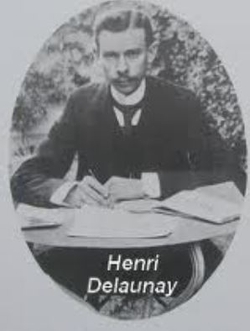 The initial idea actually came about in the 1920s when the cogs in Henri Delaunay’s head began whirring. The Frenchman had been involved in the early stages of the World Cup and wanted something similar specifically for Europe. The trophy is still named in Delaunay’s honour, but he died five years before the Soviet Union beat Yugoslavia in the first ever European Championship final in Paris.
The initial idea actually came about in the 1920s when the cogs in Henri Delaunay’s head began whirring. The Frenchman had been involved in the early stages of the World Cup and wanted something similar specifically for Europe. The trophy is still named in Delaunay’s honour, but he died five years before the Soviet Union beat Yugoslavia in the first ever European Championship final in Paris.
Only four teams played that year and the tensions were clear when Spain refused to play their game against the USSR. The number of teams steadily increased to 8 in 1980 and then 16 from 1996, as political tensions between the competing nations eased and the breakup of the Soviet Union and other states led to the creation of “new” footballing countries.
Many pundits had remarked that the Euros were a more difficult tournament to win than the World Cup because the smaller field was full of quality. However, in UEFA’s infinite wisdom, they increased the number of teams to 24 for Euro 2016. Another major change for the tournament from 2020 onwards, was that there would be no host nation. Instead, the matches are played in cities all around Europe. It remains to be seen whether this change, aimed at broadening the appeal and involvement of the competition, will prove to be successful.
Previous Winners
Spain’s three European Championship victories equal that of Germany’s all-time record (the first two German wins came with them competing as West Germany), and they actually defeated Germany in the final to claim one of them. In total, there have been ten different winners of the Delaunay trophy, but England are not among them. The Three Lions have never reached the final but came agonisingly close in Euro 96, the tournament they hosted.
The 1976 tournament is the only one that has been decided by penalties, when Czechoslovakia beat West Germany (yes, you read that right, the Germans lost on penalties). In both 1996 and 2000, the final was decided by the now-defunct golden goal rule.
Biggest Wins
There are usually big defeats for the minnows in the qualifying rounds. The unfortunate San Marino were on the end of a 13-0 walloping at the hands of Germany in 2006, but in the tournament proper there have been three 5-0 wins and the Netherlands beat Yugoslavia 6-1 in 2000 as well.
Individual Records
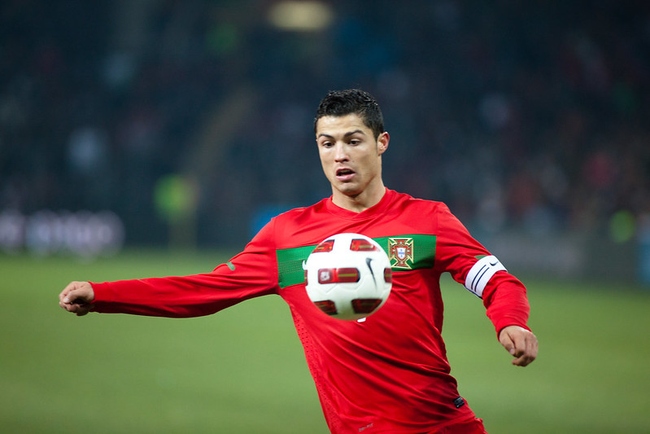
Ludovic Peron / Flickr
The top goalscorer in the history of the tournament – including qualifying – is Cristiano Ronaldo with 40 goals. He also matched Michel Platini’s record nine goals in the tournament finals, but whereas he took 21 matches to do it, Platini needed just 5. In 1984, Platini scored two hat-tricks in the same tournament adding his name to the list of just eight players to ever score hattricks at the finals. The most consistent hot-shot in European Championship history is Alan Shearer who scored in six consecutive games.
Cristiano Ronaldo also holds the record for for the most finals games played at 21, but if you include qualifiers that title goes to Gianluigi Buffon with 58. The youngest ever player was Jetro Willems who played for the Netherlands shortly after turning 18, while Hungarian goalkeeper Gábor Ferenc Király became the oldest when he stepped out against Belgium in 2016, aged 40 years and 86 days.
Team Records
The highest scoring game in the tournament was Yugoslavia’s 5-4 win over France, a game in which Yugoslavia twice came back from a two goal deficit. Yugoslavia also hold the record for the biggest comeback to get a draw when they drew 3-3 with Slovenia having been 3-0 down. The 2012 final when Spain beat Italy 4-0 was the biggest margin of victory of any final, and although Spain were the best team that year, the German team had the highest number of different goalscorers with eight.
UEFA European Championship Tournament Format
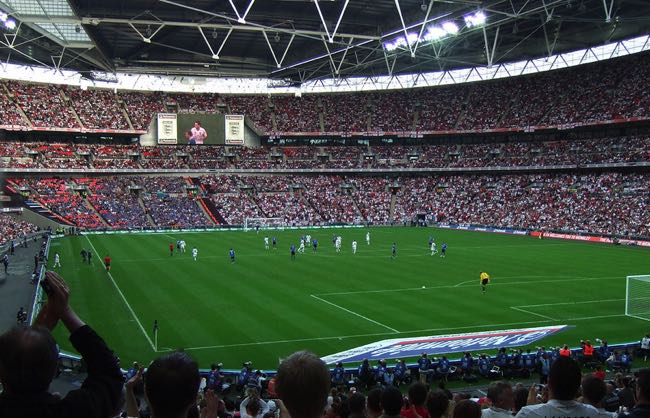
England & Estonia qualifier match (johnthescone / Flickr.com)
As you will see from the brief tournament history section, the Euros have expanded a couple of times over the years and the tournament proper includes a total of 24 teams. In theory, we could see UEFA look to expand the competition once again, probably to 32 nations, but for now, they are split into six groups of four.
Before we arrive at the final 24, however, we have the qualification process. In this section, we’ll explain how teams qualify for the Euros and then we’ll run through the format of the tournament itself once qualification has been decided.
Qualification
The qualification process for the Euros is open to all national teams that fall within the UEFA remit (unless they have been suspended for any reason, such as Russia who were suspended from qualification for Euro 2024). We’ll focus on how the qualification process runs at present (so, at the time of writing for the 2024 tournament) rather than looking back at previous tournaments.
Note that since the 1980 competition, the host nation (or nations) have qualified automatically for the tournament proper (except for Euro 2020 which was a pan-European event and so didn’t have one or two defined hosts). As such, for Euro 2024, Germany – who are hosting the tournament – do no need to go through the qualifying process as detailed below.
Qualifying Through the Groups
The qualification process for Euro 2024 saw the 53 national teams in UEFA split into pots based on their seedings and then drawn into 10 groups of five or six teams. Certain teams were kept apart for political reason (such as Belarus and Ukraine, and Kosovo and Serbia), while the number of sides in a group that were at risk of severe winter conditions was also limited to two (covering such nations as Finland, Iceland, Estonia and so on).
The seedings were based on the Nations League overall rankings from September 2022, the latest figures available prior to the draw in October 2022. The qualification process then seeks to whittle down the 53 entrants to 23 sides to join hosts Germany in the tournament finals.
Once the groups are decided, the teams then play each other team twice, once at home and once away from home. Once all group fixtures are completed, the winners of each group and the runners-up (so 20 teams in total) qualify for the tournament in Germany.
Play Off Route
While 20 sides qualify for the Euros tournament by winning or finishing second in their group, the remaining three sides are to be decided through the play offs. Prior to Euro 2020, the teams that made it to the play offs were those with the best records in the qualifying groups that hadn’t made it through. But from 2020 onwards, the teams in the play offs have been based on how they finished in the Nations League.
As such, looking at qualification for Euro 2024, the play off phase will include the four best-ranked sides from each of League A, League B and League C of the Nations League, assuming they haven’t already qualified through their qualifying group.
So, to be specific, the following teams finished in the top four positions in their Nations League pots, and hence if they don’t qualify for Euro 2024 through their qualifying group, they get another chance to qualify through the play offs:
| League A | League B | League C |
|---|---|---|
| Netherlands | Israel | Georgia |
| Croatia | Bosnia and Herzogovina | Greece |
| Spain | Serbia | Turkey |
| Italy | Scotland | Kazakhstan |
If any of these teams qualify through their group (by winning or finishing second), which is of course to be expected for a number of them, their place in the play offs will be handed to the next-best ranked side in their Nations League league. Got all that?
Each play off consists of two single-leg semis and a final. In the semis, the team ranked highest of the four will host the team ranked lowest of the four, while the team ranked second highest will host the team ranked third highest. The winners of the two semis will meet in their play off final, with the home side being decided by a draw.
Each league of the Nations League (League A, League B and League C) gets its own play off path and hence a team from each qualifies for the Euros tournament proper. Note that League D of the Nations League doesn’t get a play off route, so the likes of San Marino, Andorra and Liechtenstein will have to do it the hard way! Good luck with that fellas!
How Long Does Qualifying Take?
Here we give you the rough timeline of qualification for the Euros, using Euro 2024 as the example. Future qualifiers will likely take place around similar dates, though will vary slightly from the below:
- Qualifying Draw – 9 October, 2022
- Group Stage, Matchday 1 – 23–25 March, 2023
- Group Stage, Matchday 2 – 26–28 March, 2023
- Group Stage, Matchday 3 – 16–17 June, 2023
- Group Stage, Matchday 4 – 19–20 June, 2023
- Group Stage, Matchday 5 – 7–9 September, 2023
- Group Stage, Matchday 6 – 10–12 September, 2023
- Group Stage, Matchday 7 – 12–14 October, 2023
- Group Stage, Matchday 8 – 15–17 October, 2023
- Group Stage, Matchday 9 – 16–18 November, 2023
- Group Stage, Matchday 10 – 19–21 November, 2023
- Play-off Semi-finals – 21 March, 2024
- Play-off Finals – 26 March, 2024
Euros Finals: The Tournament Proper
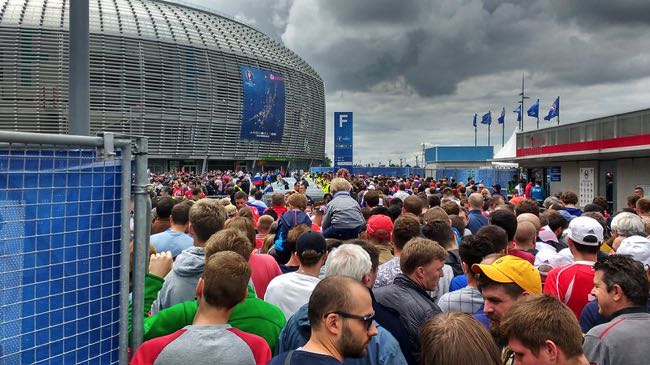
Crowds outside a group stage tournament – Russia vs Slovakia (George M. Groutas / Flickr.com)
Once qualifying is out of the way, it’s down to the real business of the tournament itself. As mentioned, Euro 2024 (like Euro 2020 and Euro 2016 before it) will have a total of 24 teams. These are split into six groups of four nations, the group phase being followed by a knockout phase of the 16 best sides. Let’s take a look in a little more detail.
Group Stage
The 24 teams are spread into the six groups based on a draw that will take place in December 2023. Note that this will be before the play off winners have been decided. The teams are seeded based on how they got on in qualifying and are placed in one of four pots, imaginatively named 1, 2, 3 and 4. Germany, as hosts, qualify in pot 1 in Group 1, so they are in position A1. Each group will have one team from each pot, with pot 1 including the highest-ranked sides, followed by pot 2, then 3, and finally pot 4 containing the nations who are deemed to be the least good.
Each team will play the three others in their group at pre-determined venues (in 2024 these are all in Germany). When all the group games have been completed, the winners and runners-up in each group will progress to the knockout phase, along with the four best third-placed sides.
Tiebreakers
If after all the group games, two or more sides have amassed the same number of points, a series of tiebreakers come into effect to work out the relative rankings of the sides. These are applied in order until it becomes apparent which side ranks higher.
The first of these is the higher number of points earned when the teams in question played one another (if indeed they did). Then comes goal difference in matches between the teams, the higher number of goals scored between the teams, and a series of other criteria (goal difference in all group games, goals scored, better disciplinary record and so on). Some may question why overall goal difference, so often the first tiebreaker, is fifth in line. We’d be with them but we must all defer to the great and unquestionable wisdom of UEFA.
Knockout Stage
Once the 16 sides to progress to the knockout stage have been decided, things become rather simple. If a side wins their Round of 16 match, they progress to the quarter finals; win that, and they are through to the semis, and then – if successful – it’s time for the final. There is no longer a third-place play off game in the Euros. Note that if any match in the knockout phase (including the final) is level after normal time, it will go to extra time. If neither side is in front at the end of extra time, the result will be decided by a penalty shootout.
The specific routes through the knockout stage are determined by the position a team have finished in their particular group. For instance, in the Euro 2024 Round of 16, we already know that the winner of Group A will face the runners-up from Group C. But given the potential for the best third-placed sides to come from any of the groups, some of the Round of 16 matches are a little less certain. For instance, the winners of Group E will face the third-place side from any one of Group A, B, C or D.
How Long Does The Euros Last?
Assuming we’re talking about the tournament proper, the Euros lasts for approximately a month. For Euro 2024, for instance, the first group game will take place on 14th June, 2024, with the final taking place on 14th July, 2024. That, by the way, is the final in the Olympiastadion, Berlin, in which England beat Germany 4-2 after extra time (you heard it here first!).
How Are the Hosts Chosen?
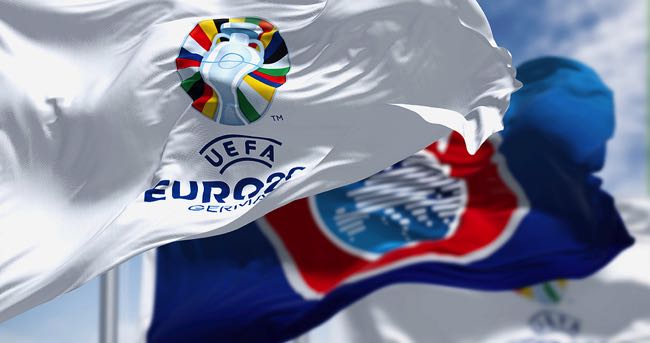
rarrarorro / Bigstockphoto.com
As with the World Cup, the hosts for the European Championship are decided by a bidding process. Unlike the World Cup, the process for the Euros hasn’t been mired in quite so much controversy over the years. The process gets underway many years before a tournament is scheduled to take place.
For instance, the bidding process for Euro 2024 began in December 2016 when applications to host the European Championship were formally invited. There were various stages after that including the submission of a bid dossier. In the case of Euro 2024, the decision to award the tournament to Germany was confirmed by UEFA on 27 September 2018.
For Euro 2028, the final announcement is scheduled to be made in September 2023, with Great Britain and Ireland’s joint bid currently looking like the favourite. Turkey are the only other nation in the running at the time of writing after the likes of Italy, Portugal and Spain showed interest but did not put bids forward or abandoned them. Nations bidding to be hosts must fulfil various criteria, including having enough large-capacity stadiums and the ability to accommodate the teams and fans without any issues.
How Do Hosts Perform & Is It an Advantage?
There is certainly a good amount of prestige that comes with hosting any major tournament and that is definitely the case with the European Championship. In theory, it should also prove a major boost to the host nation’s economy as thousands of fans descend on a country they may not otherwise have visited. They will all need to stay in hotels or other accommodation, eat at restaurants and cafes and – very possibly – buy the odd beer. Or 27.
But does playing host give the host nation any advantage when it comes to the football itself? Let’s see how the hosts have performed since the inaugural tournament way back in 1960 in France.
| Year (No of Teams) | Host(s) | Host Result | Winner |
|---|---|---|---|
| 1960 (4) | France | Fourth Place | Soviet Union |
| 1964 (4) | Spain | Winners | Spain |
| 1968 (4) | Italy | Winners | Italy |
| 1972 (4) | Belgium | Third Place | West Germany |
| 1976 (4) | Yugoslavia | Fourth Place | Czechoslovakia |
| 1980 (8) | Italy | Fourth Place | West Germany |
| 1984 (8) | France | Winners | France |
| 1988 (8) | West Germany | Semi-Finalists | Netherlands |
| 1992 (8) | Sweden | Semi-Finalists | Denmark |
| 1996 (16) | England | Semi-Finalists | Germany |
| 2000 (16) | Belgium & Netherlands | Semi-Finalists (Netherlands), Third Place in their Group (Belgium) | France |
| 2004 (16) | Portugal | Runners-Up | Greece |
| 2008 (16) | Austria & Switzerland | Third Place in their Group (Austria), Bottom of their Group (Switzerland) | Spain |
| 2012 (16) | Poland & Ukraine | Bottom of their Group (Poland), Third Place in their Group (Ukraine) | Spain |
| 2016 (24) | France | Runners-Up | Portugal |
| 2020* (24) | Various** | N/A | Italy |
- * Euro 2020 was postponed to 2021 because of the global health crisis at the time
- ** Euro 2020 was a pan-European tournament that was jointly hosted by Azerbaijan, Denmark, England, Germany, Hungary, Italy, Netherlands, Romania, Russia, Scotland and Spain, with the final in London
Looking at the above table, the first thing to note is the number of teams competing at each of the European Championship. In tournaments with 24 teams, a fourth-place finish is quite respectable. In a tournament with just four teams, however, finishing fourth is nothing to write home about… especially if you are the hosts. This is what happened to France in 1960 and Czechoslovakia in 1976.
But looking at the host nations’ performances overall, there is at least a small indication that playing at home can have a positive difference. For instance, the hosts have won the tournament three times (so a rate of 18.75%). This falls well short of the 27.27% strike rate of hosts at World Cups, however.
But if we delve deeper, since 1980 – when the tournament increased to eight teams – eight of the 13 hosts (some of whom have been joint hosts) have made it to at least the semis. Interestingly, every nation that has hosted the tournament on their own since 1980 has made at least the semis, with France performing best, winning it on home soil in 1984 and losing in the final in Paris in 2016.
Ultimately though, there’s no getting away from the fact that of the 15 European Championships to have had one or two hosts, 12 of them have been won by sides that haven’t been hosting. Since the tournament increased to 16 teams in 1996 and then again to 24 in 2016, teams also need to win a lot of matches to go all the way to glory.
In the earlier tournaments with only four teams, you only had to win two games and you were the European champions. It might be that when there are fewer matches, the potential lift a home crowd can give makes more of a difference. Whereas over longer tournaments with more games, the quality of the sides on the pitch eventually becomes more decisive.
But whether or not a nation increases their chances of winning the Euros by hosting it, there’s no doubt the home fans are always extremely appreciative of watching world-class international football on their doorstep. Roll on Euro 2028!

